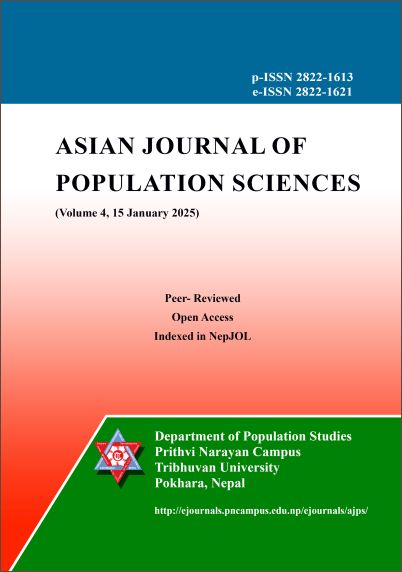Women’s Economic Autonomy in Nepal: Utilisation of Cash Earnings and Inherited Property
DOI:
https://doi.org/10.3126/ajps.v4i1.73896Keywords:
women’s autonomy, cash earning, inherited property, NepalAbstract
Women’s independent control over their earnings and property is significant for economic autonomy, but in Nepal’s patriarchal society, they face significant barriers. This study examines women’s autonomy in managing their earnings and inherited property, an area often overlooked in research. The data from the Nepal Demographic and Health Survey 2016 was used to analyse by selecting 2,415 (weighted) currently married women aged 15–49 who have their own cash earnings and inherited property among 12,862 interviewed women. The study used descriptive and logistic regression analysis with an independent decision to use both own earnings and inherited assets as the outcome variable. Results showed that the majority (56%) of women could not independently use their earnings and property. In Model II, women with three or more children (OR = 2.057; p < 0.001) and those exposed to media (OR = 1.356; p < 0.001) were more likely to be autonomous. Surprisingly, the poorest and Dalit women had higher odds of autonomy, contrary to the belief that wealthier and advantaged women are more autonomous. Women whose husbands lived elsewhere (OR = 3.080; p < 0.001) and female household heads (OR = 1.697; p < 0.001) were also more autonomous, highlighting the subordinate position women often face. These findings highlight the need to study the barriers to women’s control over their earnings and property.
Downloads
Downloads
Published
How to Cite
Issue
Section
License
Copyright (c) 2025 The Author(s)

This work is licensed under a Creative Commons Attribution-NonCommercial-ShareAlike 4.0 International License.
This license enables reusers to distribute, remix, adapt, and build upon the material in any medium or format for noncommercial purposes only, and only so long as attribution is given to the creator. If you remix, adapt, or build upon the material, you must license the modified material under identical terms.




